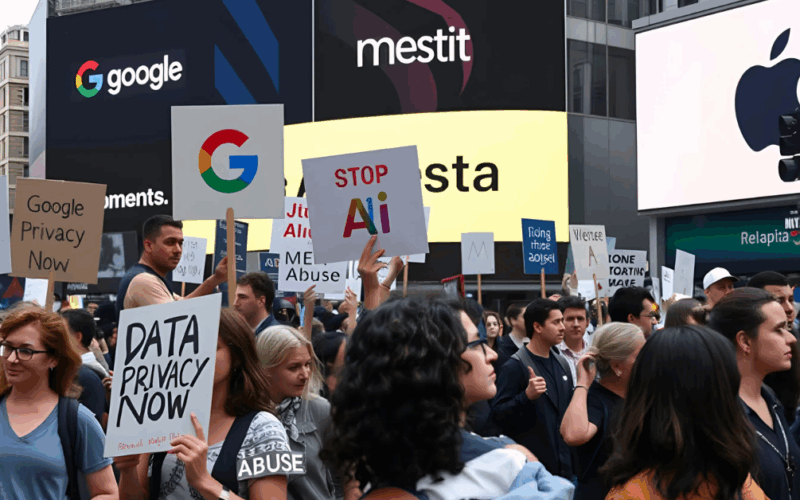Washington, D.C. – The ongoing U.S. antitrust lawsuits targeting some of the world’s most valuable Big Tech companies have taken center stage as regulators aim to curb the dominance of industry giants like Alphabet’s Google, Meta Platforms, Apple, Amazon, Microsoft, and Nvidia. These cases address concerns about market monopolies, unfair business practices, and control over key digital markets, with court battles and probes poised to shape the future of technology competition.
From Google’s compelled data sharing to meta’s acquisition scrutiny and Amazon’s pricing algorithms, each case reflects the broad scrutiny these companies face from U.S. antitrust enforcers. Here’s a comprehensive update on the status of these high-profile legal challenges.
Google’s Battle for Market Fairness
Alphabet’s Google is currently embroiled in two major antitrust battles. A recent court ruling requires Google to share search data with competitors and prohibits them from exclusive contracts that block rivals on devices. However, Google retains ownership of its Chrome browser and Android operating system, as mandated by the judge.
Despite the appeal process—which could last years—Google has proactively loosened its device and carrier agreements, signaling a shift in the search ecosystem. Additionally, Google is preparing for a September 2024 trial in Alexandria, Virginia, to decide if it must divest part of its online advertising technology due to findings of two illegal monopolies.
“While Google will likely get a reprieve from complying with the ruling until the appeal is over, the search landscape has already started to shift,” the court documents indicate.
- Google hired a former Obama official for its appellate case.
- The company faces pressure to open its advertising technology market to competition.
- Apple’s moves to integrate AI-powered search options reflect the evolving landscape.
Meta’s Antitrust Trial Over Strategic Acquisitions
Meta Platforms faced a pivotal antitrust trial over the FTC’s attempt to undo its acquisitions of Instagram and WhatsApp. The agency alleged Meta bought out potential competitors, highlighted by internal communications such as Mark Zuckerberg’s 2008 email suggesting it was “better to buy than compete.”
Meta disputes the validity of this argument, citing an incomplete social media market definition that excludes other significant players like TikTok and YouTube. A ruling is not expected until late 2025.
- FTC aims to regulate Meta’s consolidation in social media.
- Judge’s decision anticipated in late 2025.
- Meta emphasizes the need to consider wider competitive landscape beyond Facebook rivals.
Amazon Accused of Anti-Competitive Pricing Algorithms
The FTC and state regulators are litigating against Amazon for alleged anti-competitive strategies that sustain its dominance in e-commerce. The agency contends that Amazon’s algorithm artificially raised prices, costing U.S. consumers over $1 billion.
Amazon denies the ongoing use of such pricing tactics, stating it ceased the program in 2019. The trial is scheduled for February 2027 after a judge denied Amazon’s request to dismiss the case last year.
- Amazon operates more than 1 billion items on its platform.
- FTC alleges anti-competitive algorithm use inflating prices.
- Trial set for early 2027, highlighting a lengthy legal timeline.
Apple’s Legal Challenges Over App and Device Restrictions
Apple faces claims that it restricts app developers and device makers, reinforcing its high control over the iPhone ecosystem and limiting competition in markets such as smartwatches and digital payments.
The company’s effort to dismiss the case was rejected in June 2023, and the litigation process is expected to continue into early 2027, though no trial date has been announced.
- Justice Department and states allege Apple locks users in by restricting third-party apps/devices.
- Apple’s dismissal motion rejected, prolonging the antitrust investigation.
- Exchange of information expected through 2027 before trial.
Microsoft and Nvidia Under Regulatory Scrutiny
The FTC launched a probe in 2024 into Microsoft’s licensing practices within productivity software, investigating whether punitive terms block customers from switching to competitors. This investigation has yet to result in formal charges.
Meanwhile, the Justice Department is investigating Nvidia, the semiconductor titan behind chips vital for artificial intelligence applications — a company valued at over $4 trillion. No lawsuits have been filed to date.
- Microsoft’s investigation focuses on potential market abuses with cloud licensing.
- Nvidia’s probe reflects growing antitrust attention on AI chip suppliers.
- No formal cases filed against Microsoft or Nvidia yet.
Ongoing Impact and What Lies Ahead
These antitrust proceedings highlight the growing scrutiny over Big Tech’s market influence and underline the complexity of regulating digital giants with vast resources. The extensive timelines — with several trials and appeals extending into 2027 and beyond — show that meaningful outcomes could take years.
For more background and detailed updates, refer to the original Reuters coverage here.
Key Takeaways:
- Google, Meta, Apple, Amazon, Microsoft, and Nvidia are all under U.S. antitrust scrutiny.
- Significant legal battles focus on market dominance, acquisition strategies, and anti-competitive behaviors.
- Judgments will influence future competition in search, social media, e-commerce, operating systems, and AI technology.
- Many cases will not reach resolution until 2025-2027, with prolonged appeals anticipated.




